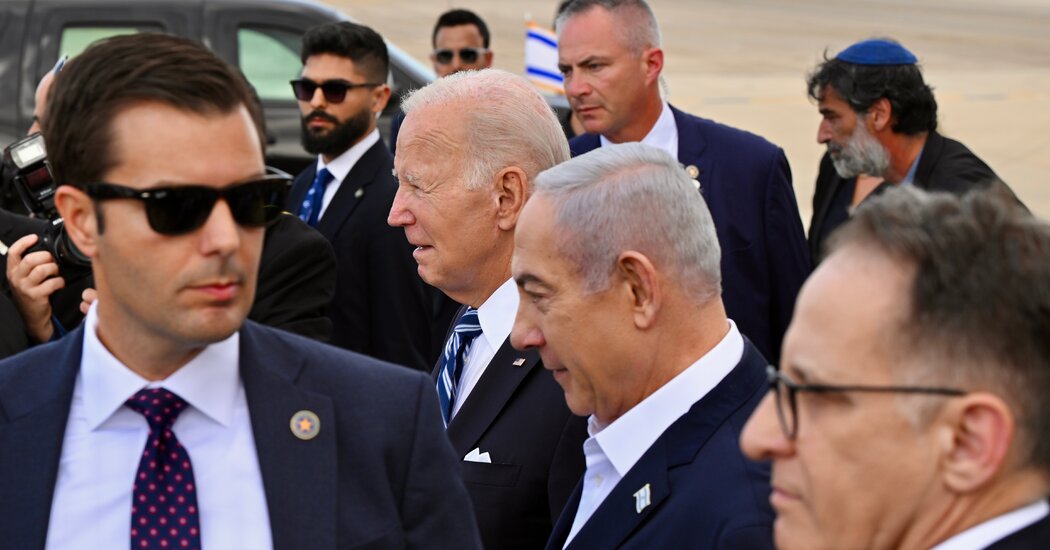
A White House spokesman said Wednesday that the Israeli government has agreed to try to reschedule the visit of a group of officials whose trip to Washington to discuss a possible assault on a key southern Gaza city was canceled due to the United States decision not to veto a UN resolution calling for an immediate ceasefire.
President Biden had asked Israel to send a delegation to Washington to discuss alternatives to a ground offensive in Rafah, the southern Gaza city where more than a million people have sought refuge. But Israeli Prime Minister Benjamin Netanyahu canceled the delegation's trip at the last minute after being angered by the United States' decision to abstain from voting on the resolution at the United Nations Security Council on Monday.
“The prime minister's office said they want to reschedule this meeting so we can talk about the Rafah operations,” White House press secretary Karine Jean-Pierre told reporters. “We welcome it. And we will work with their teams to ensure this happens.”
There was no immediate confirmation of the desire to reschedule from Netanyahu's office, which hours earlier had issued a statement denying reports that the meeting would be rescheduled. “Contrary to what has been reported, the prime minister did not approve the departure of the delegation to Washington,” the statement read.
On three previous occasions, the United States had vetoed a ceasefire resolution. But with Monday's abstention he let the resolution pass, less strongly worded than the previous ones and which called for a ceasefire for the holy month of Ramadan.
Netanyahu denounced the abstention in a statement, calling it “a retreat from the consistent American position since the beginning of the war.” The Biden administration insisted on Monday that abstention does not mean a change in the US position.
Friction between the two allies has increased due to the number of civilians in Gaza after more than five months of fighting triggered by the Hamas-led attack on October 7, which Israeli officials said killed around 1,200 people.
Health officials in Gaza say more than 32,000 people have died during the Israeli military operation and that the fighting has created terrible conditions on the ground, with aid groups warning of impending famine.
Asked about Netanyahu's previous denial of reports that the meeting would be rescheduled, Ms. Jean-Pierre was adamant that her office had agreed to try to reschedule.
“When we have an appointment, we will definitely share it with you,” he said. “This is what we know from our side.”
The announcement came just hours after Israeli Defense Minister Yoav Gallant wrote on social media that he had successfully completed his visit to the United States. The trip coincided with the UN vote and its fallout.
During his visit, Gallant met with several senior U.S. officials, including Jake Sullivan, the national security adviser, and Defense Secretary Lloyd J. Austin III, who has made Rafah a central part of his agenda.
After the meeting, a senior Defense Department official said that Austin had laid out the outlines of the Biden administration's alternative approach to a major combat operation in Rafah, including a focus on precision targeting intended to eradicate Hamas leadership.
The official, who spoke to reporters on condition of anonymity to discuss confidential talks, said the Israelis were available and that there would be more meetings in the future.
Ms. Jean-Pierre said the United States remained hopeful it could help broker a temporary ceasefire and the release of hostages held by Hamas.
In an interview with Israel's Channel 12 that aired Wednesday night, John F. Kirby, White House National Security Council spokesman, acknowledged that the talks had stalled.
“We felt like the gaps were closing and that we were getting closer to an agreement where we could free those hostages,” he said. “Now it looks like we're not moving forward, at least not in the way we all hoped, but that doesn't mean we're going to give up the effort.”
Johnatan Reiss contributed to the reporting.
